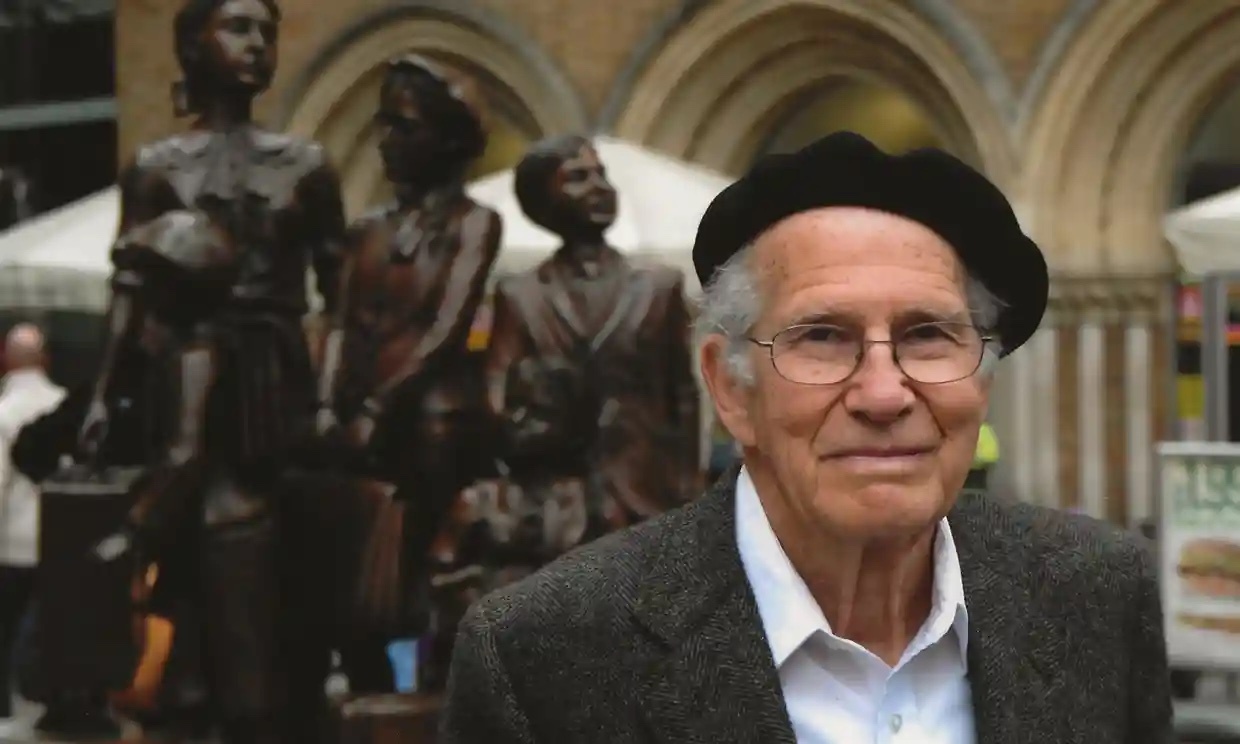29.05.2023
The remarkable journey of Ben Abeles will be celebrated next week by the opening of a new archive

Ben Abeles, photographed in 2008 in front of the Kindertransport memorial at Liverpool Street station, central London. Photograph: Helen Abeles
Ben Abeles’ impact on science was out of this world. He helped develop alloys that were key components of the radioisotope generators that powered US robot space probes on their interplanetary journeys. Nasa was then able to reveal the wonders of the solar system, from the ancient river beds of Mars to the icy moons of Jupiter.
One of the devices is still in use, providing electricity for the Perseverance robot rover that currently trundles across the surface of the red planet.
Abeles was a brilliant scientist, yet his start in life could not have been grimmer. He arrived in Britain from Prague as a child refugee on the Kindertransport, the rescue effort that helped around 10,000 children flee Nazi-occupied Europe and settle in Britain.
This remarkable journey – from fleeing Hitler to extraterrestrial travel – will be celebrated next week when the University of Southampton opens an archive of documents and photographs that tell Abeles’ life story. Items will include the tag placed round his neck when he boarded the Kindertransport; the Stuart Ballantine medal, given to him in 1979 by the US Franklin Institute for his work on powering space probes; and a note, sent home in 1941, to tell his parents: “Am healthy. Working in kitchen.”
At the end of the war, Abeles returned to what was then Czechoslovakia to search for his parents and elder sister but discovered they had died in the Trawniki concentration camp in Poland. He stayed on to study at university in Prague before emigrating to Israel and then on to New Jersey in 1956, where he worked as a physicist for 53 years.
“Ben clearly went on to live a remarkable life after arriving on the Kindertransport and did great things,” said Tony Kushner, professor of history at the University of Southampton, who has been closely involved in establishing the archive. “But that is not the reason for allowing refugees into your country – because you think they will become brilliant scientists. You do it because it’s the right thing to do, regardless of their later careers. You take in refugees in order to save people’s lives.”
This point was supported by his wife, Helen Abeles. “Ben always said that the real heroes of the Kindertransport were the parents,” she said. “They let go of their children to give them a chance. I just got on the train, he used to say. Why are they making such a fuss?”
Ben Abeles died in December 2020, aged 95, and his family has given his archive to the university’s Parkes Institute, which houses one of the largest Jewish archives in western Europe.
“He was the most positive person I have ever met, which, given the tragedies that he lived through and the difficulties of his early life, has always amazed me,” Helen Abeles told the Observer. “He was always conscious about wanting to give something back to society. So when he retired, he volunteered at a soup kitchen in New Jersey, for example.”
However, it was the generator that he developed – working with co-inventor George Cody – that was his greatest gift to society, said Charlie Ryan, an astronautics expert based at the University of Southampton. “Ben helped to develop a type of power source that has been used on some of the most groundbreaking missions ever launched, such as the Voyager probes that have explored the outer solar system and beyond. It had a massive influence on space exploration.”
Quelle: The Guardian
